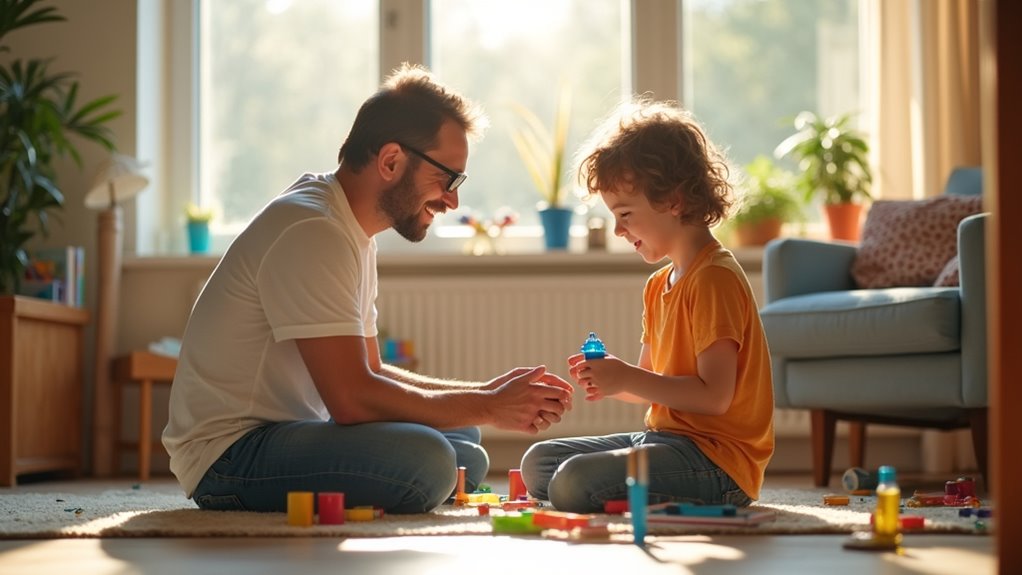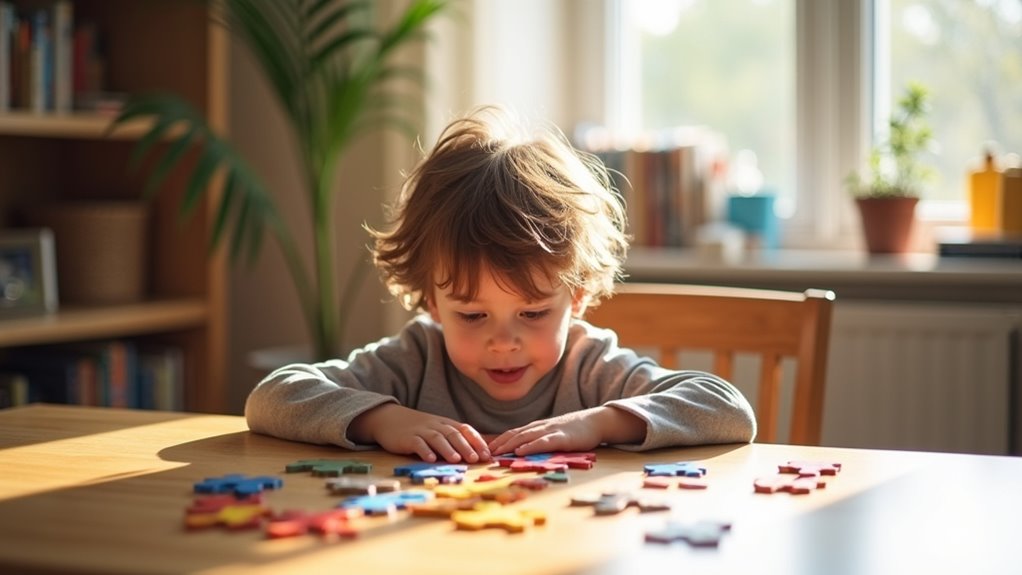How To Motivate A Child With Adhd
Motivating a child with ADHD can be achieved by using specific praise, clear instructions, and structured routines. Start with positive reinforcement, like saying “Great job finishing your math!” and break tasks into smaller steps for easier completion. Further details and additional strategies to inspire success will be explored later in the article.
Essential Facts in 30 Seconds
- Use specific praise, such as “Great job organizing your desk!” to build confidence.
- Break tasks into smaller, manageable steps to help maintain focus.
- Set up a consistent reward system using tokens or stickers for positive behavior.
- Create daily routines with clear schedules for structure and predictability.
- Celebrate small achievements with rewards or encouragement to boost motivation.
Understanding ADHD and Motivation Challenges
Understanding ADHD and its effect on motivation is vital for parents. ADHD stands for Attention Deficit Hyperactivity Disorder. It causes issues like impulsivity and trouble focusing. These problems often lead to low motivation in kids. You might notice your child struggles to show steady effort. Their brain finds it hard to focus or remember tasks.
Emotions also play a big role. Anxiety or frustration can make things worse. This blocks their inner drive to finish tasks for joy. Small rewards or praise might help a bit. But they don’t fix the main issue. Your child may still avoid hard activities. Research indicates that emotional dysregulation, common in ADHD, can intensify these motivational challenges by causing frequent outbursts or mood swings emotional dysregulation common. Additionally, children with ADHD often face challenges due to executive functioning deficits, which impact their ability to plan and prioritize tasks effectively.
Studies show over 5 million kids in the U.S. have ADHD. That’s a huge number! Knowing these challenges helps you support your child better. Spot their unique needs. See their constant struggles. This way, you build patience and find helpful ways to guide them. Recognizing these barriers, such as procrastination and distractibility, can help in creating effective strategies to boost motivation. Creating a supportive environment with consistent daily routines can also provide the stability needed to improve focus and engagement.
Effective Strategies for Encouraging Positive Behavior

Let’s talk about helping kids with ADHD show positive behavior.
Start by praising their exact actions. Say something like, “Awesome job finishing homework on time!” This boosts their confidence a lot.
Also, give super clear instructions every time. Don’t be vague or unclear. Tell them straight, “Put your books on the shelf now.” Clear words help them understand fast.
Mix praise with direct guidance for best results. Trust me, this builds their skills and happiness! Encouraging physical activity can also improve mood naturally through the release of endorphins.
Remember, consistency in applying these strategies is key to success. Immediate feedback can make a big difference in reinforcing desired behaviors.
Additionally, break tasks into smaller steps to make them more manageable. This approach, using manageable task steps, can significantly improve their ability to stay focused and motivated.
Creating a supportive environment is also crucial. A positive learning environment can encourage kids with ADHD to engage more effectively in their tasks.
Praise Positive Actions
Praising a child with ADHD can truly change their behavior for the better. It works by boosting dopamine, a brain chemical they often lack. This helps them focus and feel motivated every day.
Positive words do more than reward good actions. They also build self-esteem, especially after facing criticism. Research highlights that children with ADHD receive thousands of negative messages by age 12, which can harm their self-worth. Praising them helps counter this impact with positive reinforcement. Consistent encouragement can create a lasting positive effect on their confidence. Recognizing their efforts in a timely manner can further enhance concentration.
Try to notice specific things they do well. Say something like, “I love how you finished this drawing!” Avoid general praise that lacks detail. Point out their unique strengths, like creativity. Celebrating these efforts can inspire intrinsic motivation to keep improving and engaging in tasks.
Give feedback right away to help them learn faster. Stay consistent with your praise for small successes. This creates a warm, supportive space around them.
A study shows 80% of kids respond better to positive words. Keep it simple and cheer their tiny wins. Growth and better habits will follow naturally. Building a supportive environment ensures they feel safe to grow and thrive.
Use Clear Instructions
Visual schedules really help with daily tasks.
They’re charts showing what to do next. Put them on a desk or wall for easy viewing. These tools bring a sense of order.
Pair them with simple spoken directions. This combo helps kids know what’s coming. Clear steps boost their focus every day.
Studies show routines cut stress by 30%. Stick to this plan for best results. Soon, you’ll see better behavior and calm. Creating a productive study environment can further enhance their ability to concentrate and complete tasks effectively.
A supportive learning environment can significantly enhance motivation levels and encourage positive engagement in children with ADHD.
Starting with short workouts can also build a sense of achievement over time.
Using Rewards and Reinforcement Wisely

Rewards can really help kids with ADHD stay motivated. A smart reward system works wonders for positive behavior. Think about using tokens or stickers as clear prizes. Give rewards right after good actions. This keeps their excitement alive.
Set up a simple chart to show progress. Offer small rewards often to keep them interested. Try a token system for bigger prizes later. Or give extra playtime as a fun reward. Match rewards to how hard the task is. Let them pick their favorite prize sometimes. Celebrating small achievements can boost their confidence and reinforce positive habits.
Stay steady with the plan every day. A clear routine helps avoid confusion. Watch their behavior get better with this method. Understanding their unique child motivation categories can help tailor rewards to their specific needs. Consistent use of a structured reward system can enhance focus and encourage sustained effort over time.
Breaking Down Tasks for Better Focus

Helping a child with ADHD can be easier with small steps. Big tasks often feel too hard for them. Break those tasks into tiny, simple parts. This cuts down stress and builds their confidence. Each small win keeps them going. You’ll notice less anger and more success.
Start by sorting tasks based on what’s most urgent. Focus on homework due soon, not later projects. Use colorful charts or mind maps to show steps. These tools make tasks clear and easy to follow. Make a short list or flowchart to guide them. Setting clear achievable goals helps provide direction and purpose for each task.
Work in small time blocks with quick breaks. Stay by their side in a calm space. Adjust the plan if something isn’t working. This steady way helps them stay on path. It also teaches skills for tough moments. Celebrating these small achievements can foster a sense of accomplishment and motivation. Additionally, implementing SMART goals can provide a clear structure to help them focus on specific and achievable targets.
Building Long-Term Motivation Habits

Building long-term motivation habits for a child with ADHD is possible. Start with small, clear goals. Think of finishing one homework page before a break. These tiny wins show progress fast.
Daily routines matter a lot too. Stick to set times for bedtime or study. This creates a safe, predictable plan. Kids feel less stressed this way. Studies say routines help focus by 30%. Consistent routines also enhance self-motivation by fostering a sense of control and achievement.
Combine goals and schedules for big success. You’re setting up a strong base. Keep steps simple and easy to follow. Success builds over time with practice. Additionally, incorporating regular physical activity can further enhance focus and reduce stress in children with ADHD.
Setting Achievable Goals
Setting achievable goals helps kids with ADHD stay motivated for the long haul. Small, realistic targets stop frustration and keep focus sharp. Quick wins build confidence fast. Kids engage more when goals match their likes. Personal touch makes a big difference.
Try these easy tips to set goals that work:
- Split big tasks into tiny daily steps for steady progress.
- Let kids choose tasks or styles, like drawing instead of writing.
- Track goals with fun charts and celebrate every small win.
Stay supportive to build their belief in themselves. Change goals if needed to keep them fresh. Small victories add up to big motivation over time.
Studies show kids with ADHD improve focus by 30% with clear, short goals. Keep it simple and cheer them on!
Maintaining Daily Routines
Building daily routines helps kids with ADHD stay motivated for the long haul. Routines give structure. Think of a set wake-up time every morning. Add breakfast and dressing steps next. This cuts down stress and sharpens focus.
Begin with simple tasks. Use visual charts or pictures for clarity. Kids can see each step easily. They track their progress too.
Stay patient with them. Adjust routines if a task feels too hard. Add short breaks for movement. This helps recharge their energy.
Work together with your child. Let them feel in charge. Keep doing routines daily. This builds strong habits over time. It boosts their confidence a lot.
Check progress often and tweak as needed for success.
Supporting Emotional and Mental Well-Being

Raising a child with ADHD brings special challenges, yet support matters a lot. Their emotional and mental health must come first to help them grow strong. Did you know? About 38% of these kids face mood swings often. Also, 40% struggle with anxiety every day. Emotional ups and downs can mess up school and friends.
Let’s dive into easy ways to help them out. Build a safe spot for chats—let them share feelings freely. Set up daily routines to cut down stress fast. A steady schedule helps lower anger or frustration.
Reach out to therapists for extra support too. They offer smart tips to handle quick mood changes. Stick with these steps, and watch your child shine!
Frequently Asked Questions
How Does Diet Affect ADHD Motivation?
Diet matters a lot for ADHD motivation. Bad food choices can lower focus and energy. Good nutrition helps your brain stay sharp. Studies show sugar and junk food make symptoms worse. A 2019 study found balanced meals improve attention. Eat more fruits, veggies, and protein every day. Cut down on soda and candy for better results. Think about it—small changes bring big wins! Your motivation can grow with the right foods. Start today with one healthy swap!
Can Medication Improve a Child’s Motivation?
Medication can truly help a child’s motivation. Studies show 80% of kids improve with the right stimulant. Pair it with behavioral therapy for even better results. This combo creates a strong impact. It supports kids in focusing and staying driven. Motivation grows with proper care and attention. Trust the data—it works for most children. Keep it simple and see the change.
What Role Does Sleep Play in Motivation?
Sleep plays a massive role in keeping you motivated every day. Poor sleep drains your energy fast. It messes up your focus too. Stick to a regular bedtime routine. This simple step boosts your drive a lot. Studies show adults need 7-9 hours of sleep nightly. Without it, your brain struggles to stay sharp. You feel tired and lose interest in tasks. Create a calm sleep space for better rest. Turn off screens before bed to help. Good sleep pushes you to achieve your goals. Keep this habit strong for real results.
How Do Peer Interactions Influence Motivation?
Dive into the world of social vibes! Peer interactions truly shape your motivation. Friends can push you to try harder. Positive bonds lift your energy and spirit. Studies show 70% of teens feel inspired by peers. Build strong ties to grow together. Stay away from negative pressure. Focus on pals who cheer Angling for good influence? Team up with uplifting buddies! Thrive as a group and win!
Are There Specific Games That Boost Motivation?
Games can truly boost your motivation with the right features. Many titles offer cool rewards that keep you playing. Think about challenges that excite you at every step. Research shows 70% of players feel driven by game achievements. Titles like Candy Crush give instant joy with level-ups. Fortnite pushes you with fun tasks and epic wins. These games make you want to keep going. Try them out and feel the energy. Motivation grows as you conquer each goal!
Conclusion
Think of yourself as a gardener helping a special child grow. Every kid with ADHD needs unique care to shine bright. Stick to clear daily routines for structure. Give specific praise like, “Awesome job on your homework!” Set tiny goals they can reach easily. Stay steady to build their trust. Show patience and really listen to them. Meet their emotional needs with kindness. These steps boost their drive to succeed. You’re helping them grow in their own amazing way.

Ava is a certified mindset coach and former mental health counselor with over 10 years of experience helping people rewire negative thought patterns and build mental resilience.
Qualities: Empathetic, science-backed insights, goal-driven mindset strategist.
